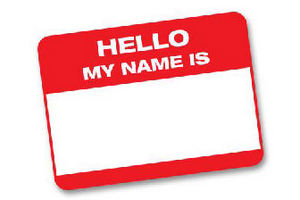What's in a name?
 Juliet Capulet, in Shakespeare's tragic tale of doomed love, pondered "What's in a name? That which we call a rose. By any other name would smell as sweet." In an effort to confront the prejudice arising from membership in their respective feuding families, Juliet insists that Romeo's deference to the Montague moniker is a meaningless and artificial convention. As a result, and out of his passion for Juliet, Romeo rejects his namesake and vows to be newly baptized as Juliet's lover.
Juliet Capulet, in Shakespeare's tragic tale of doomed love, pondered "What's in a name? That which we call a rose. By any other name would smell as sweet." In an effort to confront the prejudice arising from membership in their respective feuding families, Juliet insists that Romeo's deference to the Montague moniker is a meaningless and artificial convention. As a result, and out of his passion for Juliet, Romeo rejects his namesake and vows to be newly baptized as Juliet's lover.
What the two young lovers failed to recognize, however, was that the rest of the world did not share their sentiments defining, instead, their identities on the basis of their surnames. (I can't imagine a single person in Nova Scotia unfamiliar with the Goler clan.) Of course another more imaginative, and conveniently concocted, interpretation might hold that Romeo and Juliet is best understood as a late 16th century anti-drug narrative. Friar Laurence, Verona's trailer-park drug dealer, sold Juliet an ounce of wheelchair dope which, after smoking a two dime bowl in her Hookah pipe, somewhat predictably caused her to slip into a "two and forty hour" coma. Juliet's family, believing her dead, placed her seemingly lifeless body in the family crypt. Romeo, believing his main squeeze had OD'd, scored some Oxy from his dealer with an aim to join his beloved. When Juliet emerged from her drug-induced coma, she found Romeo's Smurf-coloured corpse, white powdery traces of Hillbilly Heroin dusting his nostrils, dead on the floor at her feet. Overcome with grief, she retrieved Romeo's gangbanger Bowie knife from its scabbard, and slit her own throat. The war on drugs rages on...
The topic at hand is not the underlying plot of a Shakespearian play; it's the importance of names and the underlying connotations which accompany those labels. The accompanying connotations are, I would argue, at the very core of communication. Would you, not to make too subtle a point, feel without reservation if the fate of the world lay in the hands of a superhero named Origami Man? Somehow I fear he'd fold under the pressure.
Take, for example, Ivan the Terrible. Crowned Russia's first Tsar, Ivan Vasilyevich (dubbed Ivan Grozny by Russians) transformed the 16th century medieval state into a multiethnic empire spanning some 1.5 million square miles. The Russian word "grozny" is usually translated into the English word "terrible". The meaning of "grozny" is more accurately defined as threatening, dangerous, formidable or inspiring fear or terror. The modern English pejorative usage which connotes bad or evil, not surprisingly, diminishes poor Ivan character somewhat.
Could Alexander the Mediocre have defeated King Darius III, conquering the entirety of the Persian empire in the 4th century BC? How much military success could a 12th century Richard the Possumheart have achieved and could he have risen to accession? And somehow I doubt that the world's second largest religion would have gained such prominence had the word of the exalted been revealed to and preached by the Chatterbox Muhammad or the Meccan Windbag. Maurice Vachon did not found the Vachon Bakery who, incidentally, produce the infamous Jos Louis cake. Maurice Vachon is best known as Mad Dog Vachon, professional Canadian wrestler and quintessential villain, who held the AWA heavyweight championship no fewer than five times throughout the 1960s. Could he have intimidated his opponents to the same extent had his handle been Maurice the Meak? Killer Kowalski struck fear into the hearts of contenders; Kuddles Kowalski would be a child's stuffed toy.
Of course no commentary on pronouns would be complete without mentioning the word nigger. Indeed, the word itself is so loathed that many individuals, fearing its utterance in any context would result in nothing short of public flogging, refer to it quite simply as the N-word. The epitome of absurdity becomes apparent when political correct pudpullers, Auburn University's English professor Alan Gribben being one noteworthy example, are compelled to extricate the word entirely from the language. Gribben, incidentally, advances the publication of a niggerless Huckleberry Finn. In his sweet and light version of the Twain classic work the word nigger has been exorcised from the text and replaced by the word "slave". I would argue that Gribben has it exactly backwards. To deny the existence of a word is to deny its vile connotations and its historical relevance. One can only wonder if Gribben would advocate a rewrite of 20th century history to remove the word "holocaust" from the literature as wall and substitute, in its stead, the more benign term: dispatched undesirables.
Recently, former Ottawa mayor Larry O'Brien, commenting on the Republican Presidential candidate debate in Florida, tweeted that "The spics are getting way too much airtime!". It seems only fitting that someone should point out to Larry, a man who in his own right would attend the opening of an envelope if a photo-op presented itself, that an equally pejorative term is Mick.
Submitted by Norm de Plume, 29 February 2012